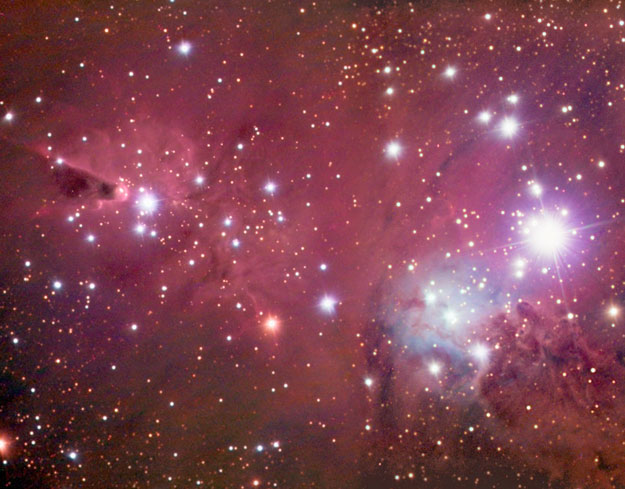Credit & Copyright: Robert Gendler
Explanation:
Sometimes the simplest shapes are the hardest to explain.
For example, the origin of the mysterious
cone-shaped region
seen on the far left remains a mystery.
The interstellar formation, dubbed the
Cone Nebula, is located about 2700
light years away.
Other features in the image include red
emission from diffuse
interstellar hydrogen,
wispy filaments of dark dust, and
bright star
S Monocerotis, visible on the far right.
Blue reflection nebulae surround the brighter stars.
The dark
Cone Nebula region clearly contains much
dust which blocks light from the
emission nebula and
open cluster
NGC 2264 behind it.
One hypothesis holds that the Cone Nebula is formed by
wind particles
from an energetic source blowing past the
Bok Globule at the head of the
cone.
1999 2000 2001 2002 2003 2004 2005 2006 2007 2008 2009 2010 2011 2012 2013 2014 2015 2016 2017 2018 2019 2020 2021 2022 2023 2024 2025 2026 |
Yanvar' Fevral' Mart Aprel' Mai Iyun' Iyul' Avgust Sentyabr' Oktyabr' Noyabr' Dekabr' |
NASA Web Site Statements, Warnings, and Disclaimers
NASA Official: Jay Norris. Specific rights apply.
A service of: LHEA at NASA / GSFC
& Michigan Tech. U.
|
Publikacii s klyuchevymi slovami:
NGC 2264 - Cone nebula - tumannost' Konus
Publikacii so slovami: NGC 2264 - Cone nebula - tumannost' Konus | |
Sm. takzhe:
Vse publikacii na tu zhe temu >> | |
